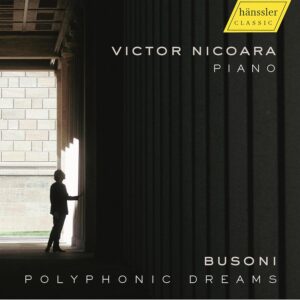Victor Nicoara’s 2021 release featuring Busoni’s Six Sonatinas introduced a pianist whose technical mastery and full-bodied sonority proved an ideal match for this composer’s idiom. Busoni’s monumental Fantasia Contrappuntistica is this follow-up release’s centerpiece, presented in Nicoara’s own “definitive” version that draws upon Busoni’s 1910, 1912 and 1922 edition. If the fine details of Nicoara’s textual choices may interest specialists more than general collectors, his impressive pianism yields nothing to the catalog competition. For starters, the warm, mellifluous sonics have a richness in the bass and singing sweetness in the treble that befit Busoni’s penchant for thick, full bodied textures, while Nicoara’s wide dynamic range illuminates the music’s gothic dimensions. You hear this at the Intermezzo’s outset, as well as in the work’s more convoluted sequences, such as the cadenza leading up into and including the fugue based on the dotted rhythms of Contrapunctus II from Bach’s The Art of Fugue.
In short, Nicoara’s rhetorical, big boned approach differs from Igor Levit’s directness and transparency, and proves equally convincing. Notwithstanding Nicoara’s obvious stylistic acumen and command throughout the Seven Polyphonic Studies, I prefer Marc-André Hamelin’s litheness and suppleness. Nor are the dense note packing and chromatic sludge of Nicoara’s Doktor Faust transcription and his original composition Nach Weil particularly easy on the ear. On the other hand, Benedict Mason’s aphoristic Pastorale makes its terse and unpredictable points within one minute and nine seconds. Larry Sitsky’s Nocturne Canonique is a slow moving study in gentle dissonance that makes subtle use of the piano’s lower and higher registers, while the concluding Bach/Busoni F Minor Sinfonia seems to get slower as it progresses. The pianist’s clear and succinct booklet notes add further value to a recommendable release.
































